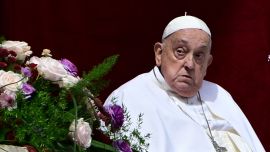Early results indicate a strong performance for Argentina’s main opposition coalition in the PASO primaries, with Juntos candidates holding a strong lead over their Frente de Todos rivals in Buenos Aires City and Province.
Around two-thirds of voters turned out to cast ballots, the lowest level for a national election since the return of democracy in 1983.
In the nation’s key battleground region, Buenos Aires Province, opposition candidates held a shock five-point lead over the ruling coalition in the race for national deputies, 38.2 percent to 33.6 percent, with 43 percent of polling stations reporting.
With the opposition posting split tickets, former Buenos Aires City Deputy Mayor Diego Santilli was in first position, taking more than 58 percent of opposition votes, followed by neuroscientist Facundo Manes, who was backed by more than 40 percent of opposition voters in the region – a strong showing for a first run at elected office
With the government’s single list (headed by Victoria Tolosa Paz) in second place on 33.6 percent, third were left-wingers FIT with 5.2 percent, followed by José Luis Espert’s Avanza Libertad slate on 4.7 percent. In fifth, dissident Peronist Florencio Randazzo scored 3.7 percent.
A similar result in November’s midterms would be a huge blow to the ruling Frente de Todos coalition, President Alberto Fernández and provincial Governor Axel Kicillof, though with more than half of votes in the region still to be counted, there is still some way to go.
Elsewhere, in Buenos Aires City – the opposition’s stronghold – Juntos candidates took in nearly half of the overall vote with more than 81 percent of polling stations reporting.
Ex-Buenos Aires Province governor María Eugenia Vidal, who switched back to the federal capital to run for national deputy, was the clear favourite for opposition voters, taking more than two-thirds of their preferences over lists headed by ex-defence minister Ricardo López Murphy and ex-health minister Adolfo Rubinstein.
In total, Juntos candidates had 48.3 percent of votes with less than 20 percent of votes still to be counted. Frente de Todos’ list headed by Leandro Santoro was on 24.5 percent, with Avanza Libertad and Javier Milei scoring an impressive 13.6 percent in the outspoken economist’s first run for office.
Electoral test
Sunday’s primaries are President Alberto Fernández’s first electoral test since taking office in December 2019, three months before Argentina registered its first case of Covid-19.
Speaking earlier in the evening, Interior Minister Eduardo ‘Wado’ de Pedro said as polls closed that turnout as of 6pm was 67 percent, with voting still ongoing at 1,900 locations. He described that as “a very good number considering it is an election in the middle of a pandemic."
"If the health protocols allow the votes to continue to be counted, we will be processing all the telegrams that reach us and we could be ready to give the first provisional results at around 9pm,” he said.
In Argentina, citizens can participate in elections from 16 upwards, though voting is mandatory for those aged between 18 and 69.
Since March 2020, the country has recorded close to 5.5 million infections and more than 113,000 fatalities from Covid-19. Infections have decreased over the last few months, however, as the government’s mass vaccination campaign progresses. Close to 64 percent of the population has now received one dose of Covid-19 vaccine, with 40.52 percent having received two.
The election is also taking place against a backdrop of economic turmoil. Argentina recorded a steep 9.9 percent decline in GDP in 2020, for the most part due to the coronavirus pandemic, and while the economy is gradually recovering, thousands have lost their jobs and the country is still struggling with runaway inflation. According to the most recent government data, prices have increased by 51.8 percent of the last 12 months. They rose 29.1 percent from January to July this year alone.
– TIMES/AFP























Comments